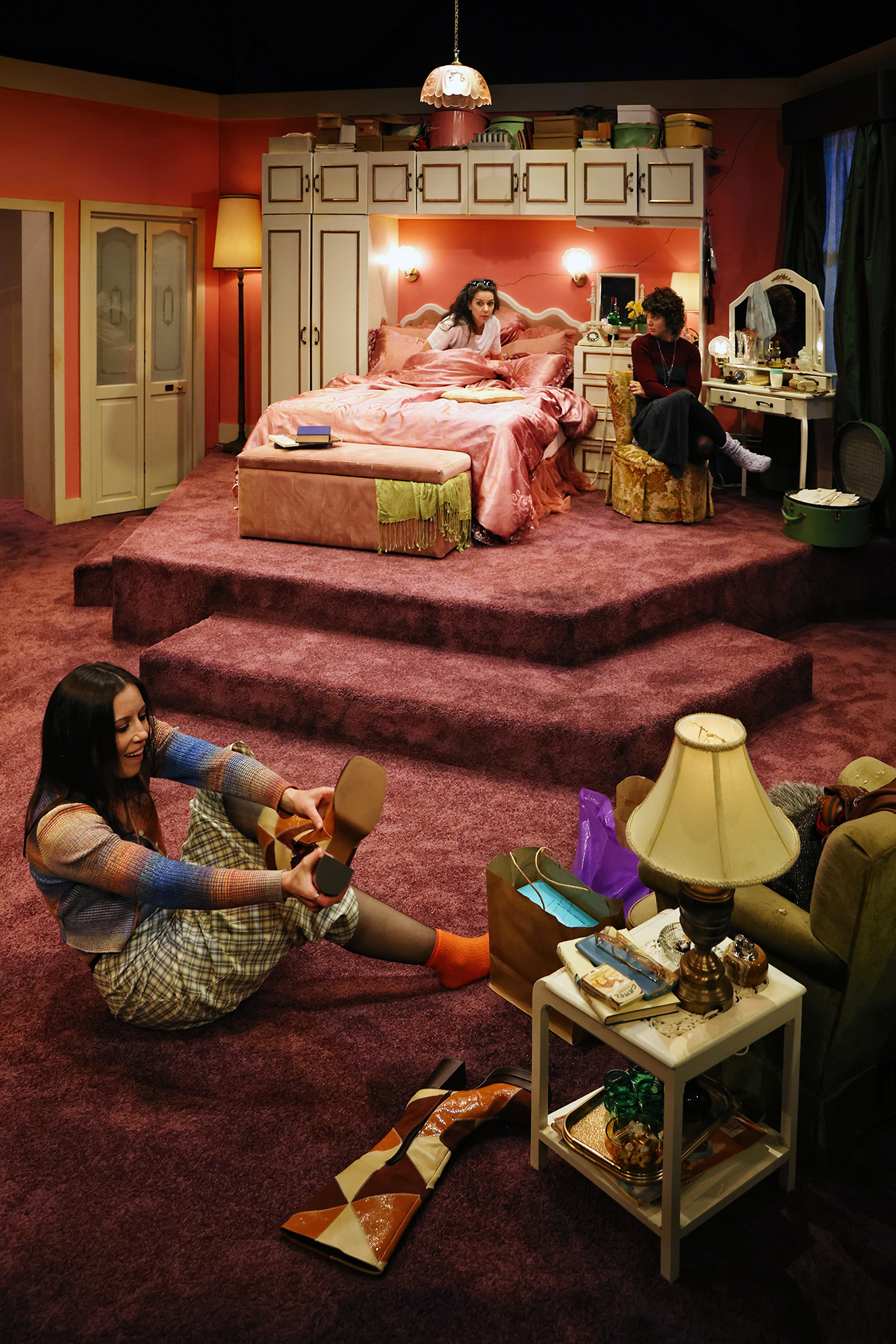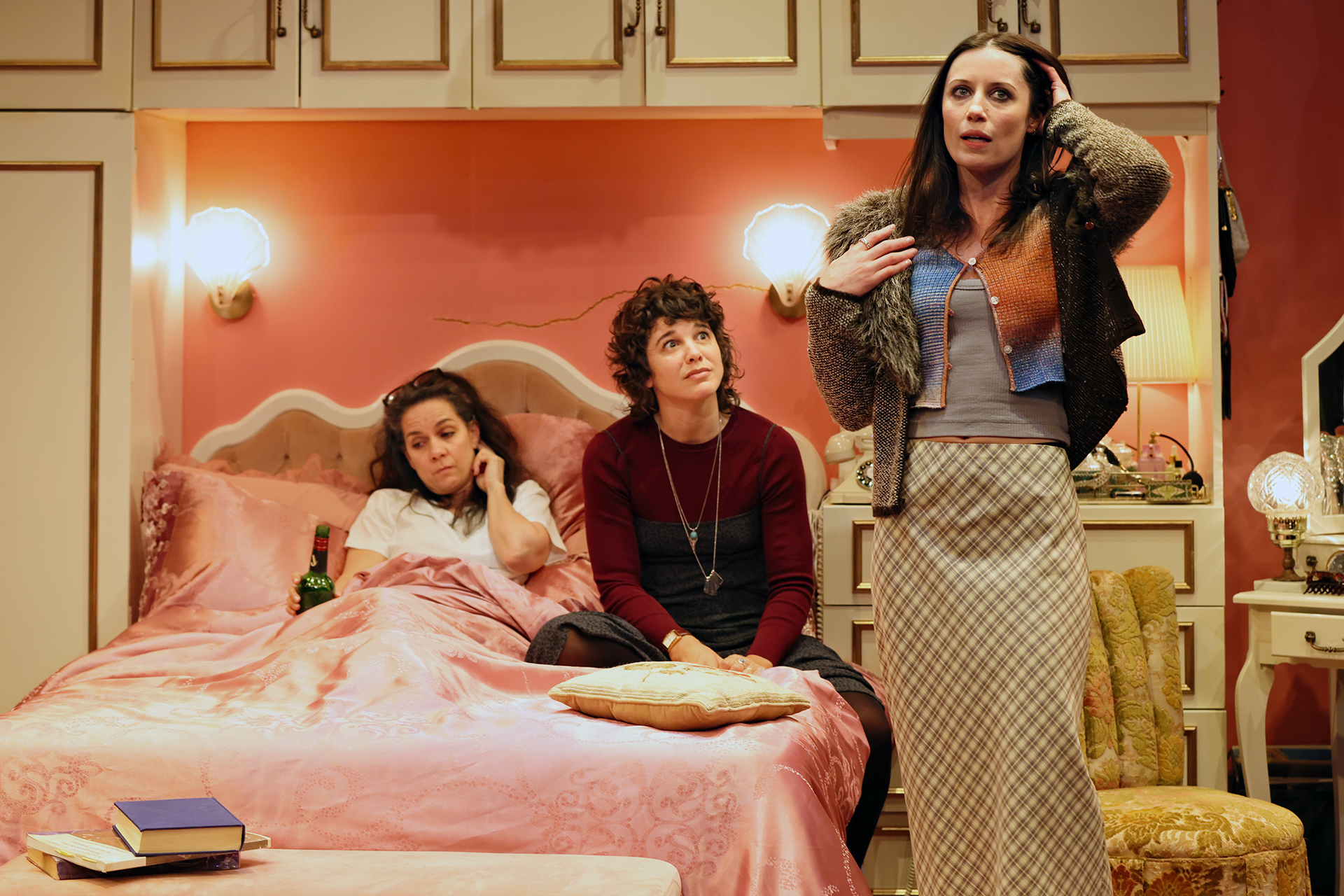By Shelagh Stephenson. Ensemble Theatre, Sydney. Directed by Rachel Chant. 20 October – 25 November, 2023
Reviewed : 25 October. 2023*

The title of this play by Shelagh Stephenson is based on the premise that no matter how much a water solution is diluted, the water will retain the ‘memory’ of the substance that has run through it. In some ways our memories are similar – but, as director Rachel Chant explains: “Memories are an act of subjective re-creation, altered and reconstructed to aid our own survival. No two recollections will be the same”.
In The Memory of Water Stephenson brings three sisters together to organise their mother Vi’s funeral. Naturally they begin to reminisce, and Stephenson uses their different perceptions of the past to show “the slipperiness of memory and the heightened, contradictory emotions that are released when you lose a parent”.
That it is a comedy is testament to the fact that families are funny, that even in difficult situations, memories evoke a host of nostalgic reactions, some of them sad, some of them contentious, some of them hilarious. It is the latter on which Stephenson – and Chant – concentrate, but not at the expense of poignancy nor tenderness.

The play takes place in the mother’s bedroom and designer Veronique Benett establishes the tone of the production with a set that is painstakingly pink, and plush, and prissy! The cupboards above the bed are stacked with paraphernalia – boxes, make up cases, a set of hot rollers! Trinkets clutter every surface, the satin quilt cover shimmers pinkly and a green velvet curtain covers the window and keeps out the cold, wintery Yorkshire night. The detail is fastidious and the changes in mood are fittingly intensified by Kelsey Lee’s mellow lighting.
The set reflects Vi’s personality and Chant uses it effectively, symbolically centring on and around the bed which is set on a double plinth.
Under the satin cover, the eldest sister, Mary (Michala Banas), wakes to ‘a visitation’ from a younger Vi (Nicole Da Silva) dressed in vibrant green satin, and sitting elegantly at the dressing table. Their hallucinatory conversation suggests that things were not always happy and this sets the tenor for the rest of the play as Mary and her sister Teresa (Jo Downing) and Catherine (Madeleine Jones) talk, argue, cry … and laugh.

Mary is a doctor who is deeply concerned about her patients – and deeply involved in a 5year relationship with Mike (Johnny Nasser) a celebrity doctor who is married with three children. Banas finds the acumen of the professional, the affectionate tolerance of the ‘big sister’ and the vulnerability of ‘the other woman’ in carefully judged and layered performance. Her immaculately timed pauses and the expressions that accompany them augment both the humour in her lines – and the devastating anguish she feels when a hope she has been clinging to for twenty-five years is cruelly crushed.
Teresa, the middle sister, who has spent more time with their mother runs an alternative well-being business with her second husband Frank (Thomas Campbell). She is down-to-earth, organised, in control – except when she’s had a drink – and Jo Downing makes her busily caring and dependable – except when she’s had a drink! Then she becomes verbose, accusative, loud and wobbly. Her ‘wobbly’ is played very effectively by Downing who takes her there gradually through a slight slur, gradual increases in volume, more thoughtless reactions – and a delightfully natural slip off the end of the bed.

The youngest of the sisters, Catherine lacks the self-esteem of her older siblings – and Madeleine Jones plays her perfectly. Jones finds all of Catherine’s insecurities and attention seeking in a performance that is both funny and empathetic. Willowy and flexible, she gives Catherine an awkward but fluid grace as she paces sulkily, flings her arms expressively, as she wails about another failed romance, throws herself at the mercy of her sisters (who have obviously “heard it all before”), and turns for comfort to her brother-in-law Frank, who flees from her affection seeking approach!
 It would be easy to believe that these three are sisters! Physically they are similar – and under Chant’s direction they have achieved that similarity of expression and gesture and reaction that is so often noted of female siblings, as well as the togetherness that comes from shared experiences and family jokes. Nowhere was this more evident than in a raucous scene that began with sorting their mother’s wardrobe – and ended with them parading on and around the bed in an array of colourful clothes and outrageous hats. The energy and pace of this scene was so carefully choreographed and meticulously rehearsed that it seemed spontaneous and absurdly natural.
It would be easy to believe that these three are sisters! Physically they are similar – and under Chant’s direction they have achieved that similarity of expression and gesture and reaction that is so often noted of female siblings, as well as the togetherness that comes from shared experiences and family jokes. Nowhere was this more evident than in a raucous scene that began with sorting their mother’s wardrobe – and ended with them parading on and around the bed in an array of colourful clothes and outrageous hats. The energy and pace of this scene was so carefully choreographed and meticulously rehearsed that it seemed spontaneous and absurdly natural.
Chant’s concentration on timing and pace ensured that naturalness and the depth that made the women – and Mike and Frank – so convincing.
As the ‘intimate observers’ in the play, Johnny Vasser and Thomas Campbell provide foils the sisters and deliver some delicious one-liners.
After an unexpected of entry, Vasser establishes both the intimacy and strained secrecy of Mike’s relationship with Mary – and his wariness of her sisters, and though they voice their distrust clearly, he retains calm and taciturn, watching and always aware.
Campbell on the other hand, is one of the family, and hence the brunt of sisterly criticism and banter which he bears steadfastly and stolidly. Campbell has excellent comic timing and uses pause and pace to humorous effect – especially in his struggle to stop Theresa’s drinking, and in extricating himself from Catherine’s amorous attack.

Nicole Da Silva ‘s Vi ‘appears’ only for brief moments, almost drifting onto the stage, and wryly observing the effect of her demise … and highlighting her influence on her daughters.
The drawling vowels and missed consonants of the Yorkshire accent have been carefully schooled by dialect coach Linda Nicholls-Gidley and add to the veracity of the production, especially as the snowy winter is an intrinsic character in the play!
Rachel Chant has brought Stephenson’s play – first produced 27 years ago – to renewed, vibrant, funny, poignant life on a memorable set at the Ensemble. Sister siblings should see it together! (As one of four sisters, I know you’ll see yourselves!)
*Opening Night